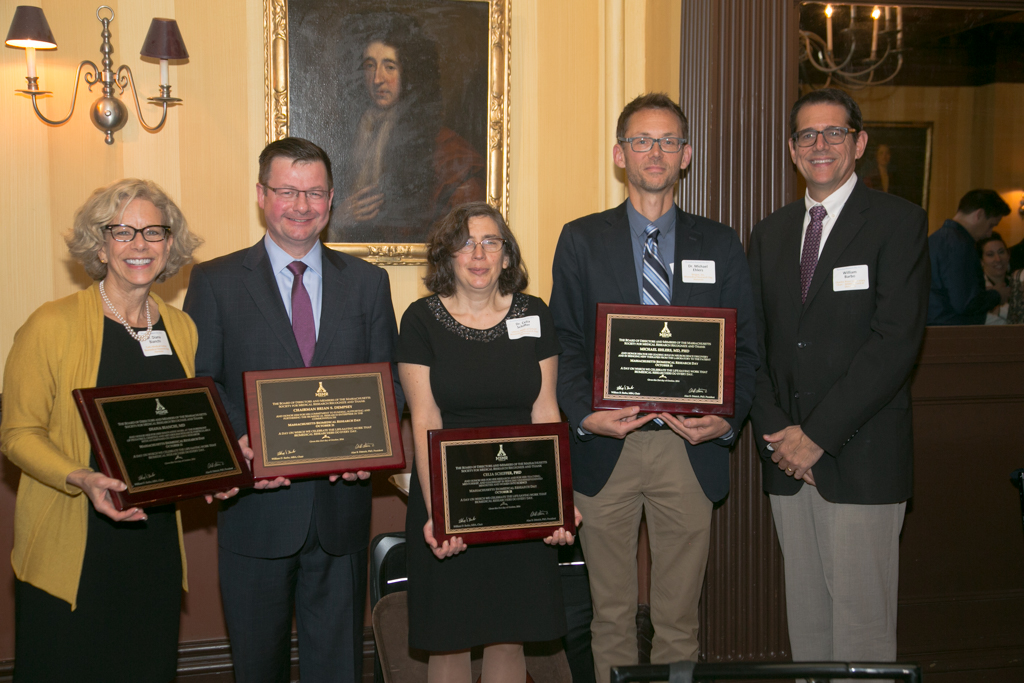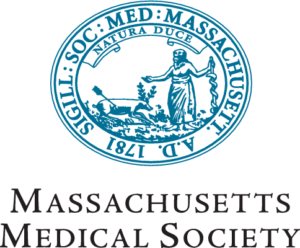In 2006 the Massachusetts Legislature designated October 21st as Massachusetts Biomedical Research Day, to recognize the contribution biomedical research makes to the health and well-being of the citizens of the Commonwealth and people around the world.
Each year the Massachusetts Society for Medical Research recognizes and honors several individuals for their outstanding part in the biomedical research world. We recognize researchers, educators, business leaders and public officials who have provided significant new knowledge, leadership and support. This year’s Honorees are Dr. Diana Bianchi, Dr. Michael Ehlers, Dr. Linda Griffith, Rep. Brian S. Dempsey and Dr. Celia Schiffer.
At a Biomedical Research Day Luncheon in October, Travis McCready, President and CEO of the Mass. Life Sciences Center, welcomed the guests and spoke about the importance of the work that biomedical researchers in Massachusetts perform. After receiving an award, each honoree spo about her or his passion for this work and where it may lead us.
The 2016 Biomedical Research Day Honorees
Educator
Celia Schiffer, PhD University of Massachusetts Medical School, Department of Biochemistry and Molecular Pharmacology, Institute for Drug Resistance, Schiffer Lab
Recognized for her research and for her teaching, mentorship, and leadership in bringing underrepresented minorities and women into science.
“Drug resistance occurs when through evolution a disease no longer responds to medications. Resistance impacts the lives of millions, limiting the effectiveness of many of our most potent drugs. This often happens under the selective pressure of therapy in bacterial, viral and fungal infections and cancer due to their rapid evolution” says Celia Schiffer a Professor in the Department of Biochemistry and Molecular Pharmacology, University of Massachusetts Medical School.
Dr. Schiffer has developed a strategy to lessen the probability that drug resistance occurs. She has done so at the initial stage of drug development when the drug is first being designed. She realized that through understanding the molecular mechanism by which the disease process occurs, in atomic detail, she could use structure based drug design to develop inhibitors that block the disease in such a way that the likelihood of resistance occurring is greatly reduced. She demonstrated this strategy with targets in two globally pandemic viruses: HIV and Hepatitis C and is showing this strategy generalizable to many other diseases. By designing drugs to be less susceptible to drug resistance, the drugs are more likely to last and stay effective. Finding other general parallels to avoid drug resistance motivated her to conceptualize and co-founded the Institute for Drug Resistance, as drugs that retain their ability to be effective is ultimately better for both the individual patient and for society as a whole.
Dr. Schiffer has a BA in physics from the University of Chicago, PhD in biophysics from University of California, San Francisco, with postdoctoral training at the ETH in Zurich, Switzerland and Genentech, Inc. She has directed numerous collaborative NIH and other grants totaling over $45M, including three NIH program project awards from the National Institute of General Medical Sciences. She has published over 130 peer reviewed journal articles, using a combination of experimental and computational structural biology techniques to obtain key insights into drug resistance. In 2015 she became a fellow of the American Academy of Microbiology.
Mentorship is an integral component of Dr. Schiffer’s world-class research program. In her nearly 19 years at University of Massachusetts Medical School, Dr. Schiffer has personally mentored 40 scholars in her research group (including PhD students, postdoctoral associates and non-tenure faculty). She has established one of the most diverse research laboratories in the University that includes: 17 women and 21 international scholars (from 14 nations around the world spanning Asia, the Middle East, Africa and Europe) of diverse religious and economic backgrounds. Of the 24 PhD (5 MD/PhD) students, 16 students have graduated – and have gone on to successful careers in medicine and science. In addition six of her students/alumni are underrepresented minority students, four who have, to-date, received prestigious NIH Ruth L. Kirschstein National Research Service Award Individual Predoctoral Fellowship to Promote Diversity in Health-Related Research. In December of 2015, Ashley Matthew, an MD/PhD student who works in Dr. Schiffer’s lab, was highlighted in the NIH Director’s blog. Dr. Schiffer has demonstrated the ability to provide a safe and supportive environment where science can thrive. In 2010 she received the UMass Medical School’s Outstanding Mentoring to Women Faculty Award and most recently in 2016 she was honored by the inaugural Chancellor’s Award for Excellence in Mentoring.
Investigator
Linda Griffith, PhD, MIT, Center for Gynepathology Research, Griffith Lab
Recognized for her work in the under-researched area of endometriosis. Also, a fundamental contributor to the science and building of organs on chips and a MacArthur Fellow.
“Together, we’re building interactive organs,” says Linda Griffith, professor of biological and mechanical engineering. That’s the goal of the Defense Advanced Research Projects Agency (DARPA) research program known formally as the Microphysiological Systems program and informally as the “body on a chip” program.
“DARPA had a vision to replicate all 10 human physiological systems on a single research platform to allow the researcher to look at crosstalk between the systems, such as the liver with the gut or with reproductive systems,” Griffith says. She directs the Barrier-Immune-Organ: MIcrophysiology, Microenvironment Engineered Tissue Construct Systems (BIO-MIMETICS) program, one effort under the DARPA program. BIO-MIMETICS has numerous collaborators at MIT as well as the Charles Stark Draper Laboratory, the University of Pittsburgh, Northeastern University, and Zyoxel of Oxford, United Kingdom.
“I myself had triple-negative breast cancer, and I came to appreciate how hard it is to develop new cancer drugs to treat patients,” Griffith says. “We don’t know why chemotherapies fail in a very significant percentage of patients with triple-negative breast cancer.”
Those patients typically die of metastasized tumors that have spread to the liver and other organs. Tiny metastatic tumors in these organs may lie dormant for years, and the combination of tissue engineering with systems biology provides new opportunities to study what triggers the tumors’ activation.
“You can put cancer cells in our liver bioreactors and get them to quiet down, just as one of these silent micrometastases might do in a patient,” Griffith says. “Now we have a human model that lets us study what stimulates those cancer cells to die or proliferate.”
Griffith and her colleagues also take a systems-biology approach in an investigation of endometriosis, a painful and sometimes debilitating condition in which pieces of the uterine lining migrate out of the uterus and grow in the abdominal cavity. The disease afflicts up to 10 percent of women, often takes years to diagnose, and is typically treated only with surgery.
More broadly, “there are tremendous opportunities for this systems-biology approach in women’s reproductive health,” Griffith says. She is also bringing her tissue-engineering expertise to the field; the “body on a chip” program that she directs will incorporate tissue models addressing aspects of women’s reproductive health.
Griffith directs the MIT Center for Gynepathology Research, established in 2009 to help meet what she calls “a huge unmet need in women’s reproductive health” — finding better treatments for conditions such as endometriosis, fibroids, and adenomyosis that have seen relatively little federal research funding and few advances in recent years.
The Center brings together a broad group of MIT researchers with gynecological surgeons and industry partners. “We’re working very closely with wonderful advisors in industry who are cheering us on, because until they have models of efficacy and can unravel a new research direction it’s very hard for companies to make a commitment to these diseases,” Griffith says.
Investigator
Diana Bianchi, MD, Tufts University’s Sackler School of Biomedical Sciences, Bianchi Lab, Tufts Medical Center’s Mother Infant Research Institute. On November 7, Dr. Bianchi will assume her new position as Director of the National Institute of Child Health and Human Development at NIH.
Recognized for her work in pediatrics, genetics and metabolism, particularly non-invasive research; Institute of Medicine member, Neonatal Landmark Award.
“We study cell-free nucleic acids that traffic between the fetus and the pregnant woman to develop noninvasive methods of prenatal diagnosis. In addition, we analyze gene expression information derived from human amniotic fluid in order to develop new insights into human fetal development. This “amniotic fluid transcriptome” reflects real-time information from multiple fetal organs, particularly the brain. In prior studies we have shown that each fetal genetic condition has characteristic and consistent pathway and network abnormalities that are present as early as the second trimester. For example, in fetuses with Down syndrome, oxidative stress is a major abnormality. We are applying the information contained in the transcriptome to develop novel approaches to prenatal treatment of fetuses with congenital anomalies.”
She is a member of the Clinical Advisory Board of Verinata Health, an Illumina company. Dr. Bianchi is one of four authors of the book Fetology: Diagnosis and Management of the Fetal Patient. This book won the Association of American Publishers award for the best textbook in clinical medicine in 2000. Bianchi joined the faculty at Harvard University in 1986, concurrently assuming a position as an attending neonatologist and geneticist at Boston Children’s Hospital. In 1993, Bianchi left to take a position at Tufts University School of Medicine, receiving an endowed chair in 2002.
In 2007, Bianchi became Editor-in-Chief of Prenatal Diagnosis, the official journal of the International Society for Prenatal Diagnosis. In 2010, she founded the Mother Infant Research Institute (MIRI) at Tufts Medical Center, assuming the position of Executive Director.
Bianchi worked for many years on developing methods to isolate intact fetal cells from maternal blood as a noninvasive way to obtain fetal material for genetic diagnosis. While the work proved challenging due to the relative rarity of the fetal cells in the mother’s blood, the research led to an unexpected finding. Bianchi discovered that intact fetal cells remain in the mother’s blood and organs for decades following pregnancy, with the possibility of migrating to the site of an injury in the mother, dividing and changing into the cells needed to fix the problem. This has led to a field of study known as fetal cell microchimerism.
Dr. Bianchi has also worked extensively on noninvasive prenatal testing (NIPT) using DNA sequencing of fetal and placental DNA fragments in the blood of pregnant women. As of 2011, this technology has translated to clinical prenatal care. In addition, Bianchi has pioneered the study of the amniotic fluid fetal transcriptome to develop new approaches to prenatal treatment of genetic conditions. In 2014, Bianchi was the lead author on a study published in the New England Journal of Medicine that examined cell free fetal DNA test performance in a general obstetrical population. This study showed that cell free DNA testing had lower false positive rates and higher positive predictive values than maternal serum biochemistry analyses with or without ultrasound measurements of the back of the fetal neck. Currently, Bianchi is working with a mouse model to develop a prenatal treatment that could be given to a pregnant woman carrying a fetus with Down syndrome. The goal of the work is to improve brain development in the womb and neurocognition after birth.
Business Leader
Michael Ehlers, MD, PhD, Executive Vice President, R&D, Biogen, Inc.
Recognized for his leading role in neuroscience discovery and commercialization at a major pharma company. Howard Hughes Medical Institute investigator.
Prior to his recent move to Biogen, Michael Ehlers, MD, PhD was the Senior Vice President of BioTherapeutics and Chief Scientific Officer of the Neuroscience Research Unit at Pfizer, where he and his team were translating mechanistic understanding of brain disorders into next generation therapeutics. Prior to joining Pfizer, Dr. Ehlers was the George Barth Geller Professor of Neurobiology and an Investigator of the Howard Hughes Medical Institute at Duke University Medical Center.
Raised in in rural Nebraska, Dr. Ehlers earned his bachelor’s degree in chemistry from Caltech. He holds MD and PhD degrees from the Johns Hopkins University School of Medicine, where he pioneered studies on neuronal cell biology and the trafficking of glutamate receptors.
Dr. Ehlers is the recipient of numerous awards including the 2003 Eppendorf & Science Prize in Neurobiology, the 2007 John J. Abel Award in Pharmacology, the 2007 Society for Neuroscience Young Investigator Award, and the 2009 National Alliance for Schizophrenia and Depression Distinguished Investigator Award. He received the 2008 Breakthrough Research Award of the North Carolina Biotechnology Center given to a single scientist in North Carolina. In 2013, he became the 11th recipient of the Thudichum Medal of the Biochemical Society of the United Kingdom – an award inaugurated in 1974 to honor eminent scientists who have made outstanding contributions to neurochemistry and related subjects and whose recipients include two Nobel laureates.
Dr. Ehlers has authored over 90 scientific papers, has served on the Editorial Boards of Annual Reviews in Medicine, Annual Reviews in Pharmacology and Toxicology, the Journal of Neuroscience, the Journal of Biological Chemistry, and Molecular and Cellular Neuroscience, and sat on advisory committees of the National Institutes of Health. He is a member of the PhRMA Foundation Basic Pharmacology Advisory committee, the Janelia Farm Research Institute Advisory Committee, the McKnight Endowment Fund for Neuroscience Board, the Institute of Medicine’s Board on Health Science Policy, and the World Economic Forum Global Agenda Council on Brain Research. He serves on the scientific advisory boards of several private foundations, and has advised major pharmaceutical, venture, and biotech companies.
“There were many motivating factors in my decision to move to industry, but the most significant was the chance to expand the impact of my science. I felt certain that I could continue publishing papers and building knowledge in my specific field in my academic lab. I had always approached my ‘purpose’ as generating fundamental knowledge, with the diffuse notion that someone somewhere would figure out what these findings are useful for. Having had growing occasions to interface with biotech and pharma, I began to see a world occupied by such people – and I became compelled by the challenge to convert emerging science into new medicines in neuroscience and beyond, in areas where progress has been slow despite immense medical need. In my estimation, this translation can only be done at scale in the pharmaceutical industry. I felt that it was a good time to take on a new challenge.”
Public Official
Chairman Brian S. Dempsey, 3rd Essex. Co-chair, joint committee on Ways and Means.
Recognized for his commitment to funding, supporting and furthering the biomedical research enterprise in the Commonwealth.
Representative Brian Dempsey has been a member of the Massachusetts House of Representatives since 1991. He represents the 3rd Essex District which comprises the City of Haverhill. Since that time he has been selected by his colleagues to serve as the Chairman of five different legislative committees. They include the Committee on Public Service, the Committee on Telecommunications, Utilities and Energy, the Committee on Science and Technology, and the Committee on Economic Development and Emerging Technologies.
For the past 6 years he has served as the Chairman of the House Committee on Ways and Means. In this important role, he has led the House of Representative’s efforts to prioritize the allocation of state resources while consistently delivering a balanced state budget. He has also provided the primary leadership for the implementation of numerous policy initiatives that have proved to be so successful in enhancing the continuous economic growth of the Commonwealth.
As Chairman of the Committee on Economic Development and Emerging Technologies, Chairman Dempsey co-authored the Act Relative to Economic Development Reorganization and provided the leadership for the passage of the legislation to expand gaming opportunities in the Commonwealth. While Chairman of the Committee on Telecommunications, Utilities and Energy, he authored the Green Communities Act, that was signed into law in 2008. That landmark law places a comprehensive focus on major energy efficiency and renewable energy throughout the Commonwealth. His efforts have made Massachusetts a leader in the area of clean and renewable energy. As the Chairman of Ways and Means, he is also the co-author of numerous laws to promote innovative economic policies which have helped strengthen the Massachusetts economy and create new jobs in all sectors of the economy for the residents of the Commonwealth.
Chairman Dempsey is a 1984 graduate of Haverhill High School and a graduate of the University of Massachusetts at Lowell where he received a Bachelor of Arts. He lives in his home town of Haverhill with his wife Julie and their three children, Ryan, Tyler and Brittany.
Our generous Biomedical Research Day Luncheon Sponsors
Alexandria Real Estate Equities
The Massachusetts Medical Society





